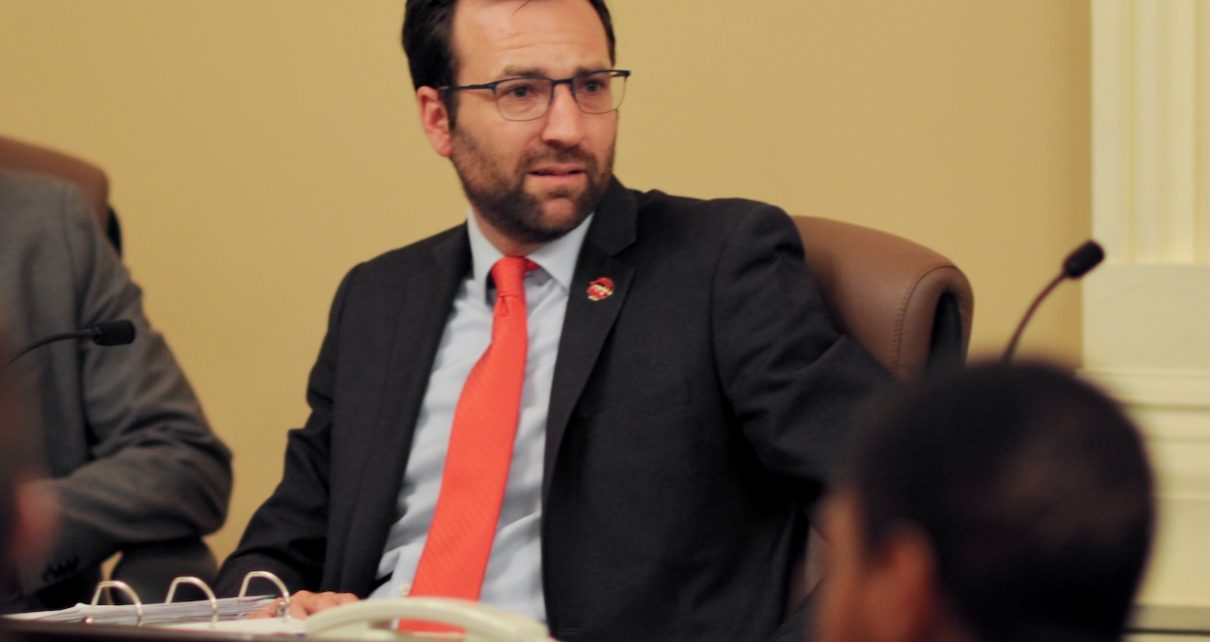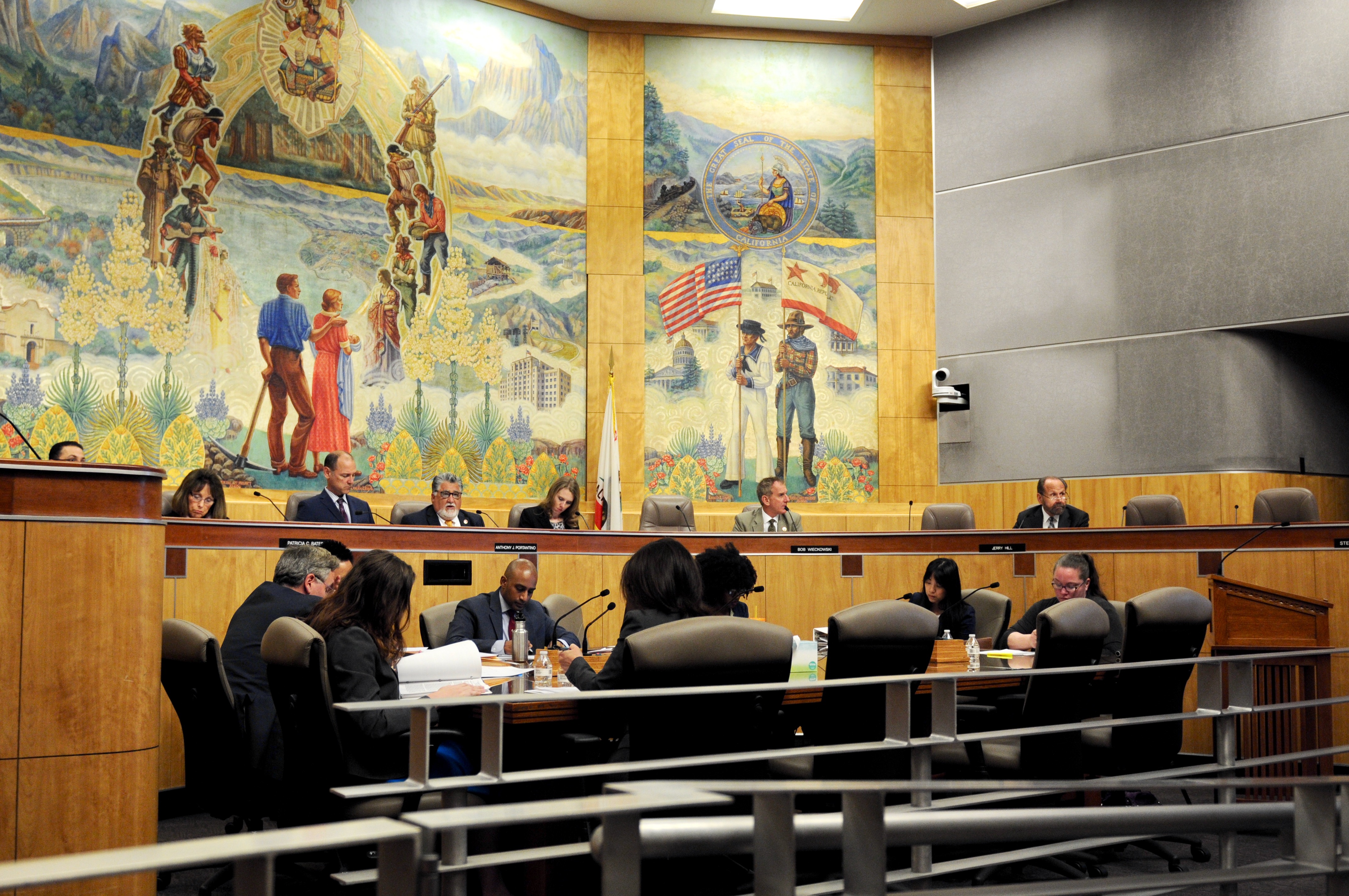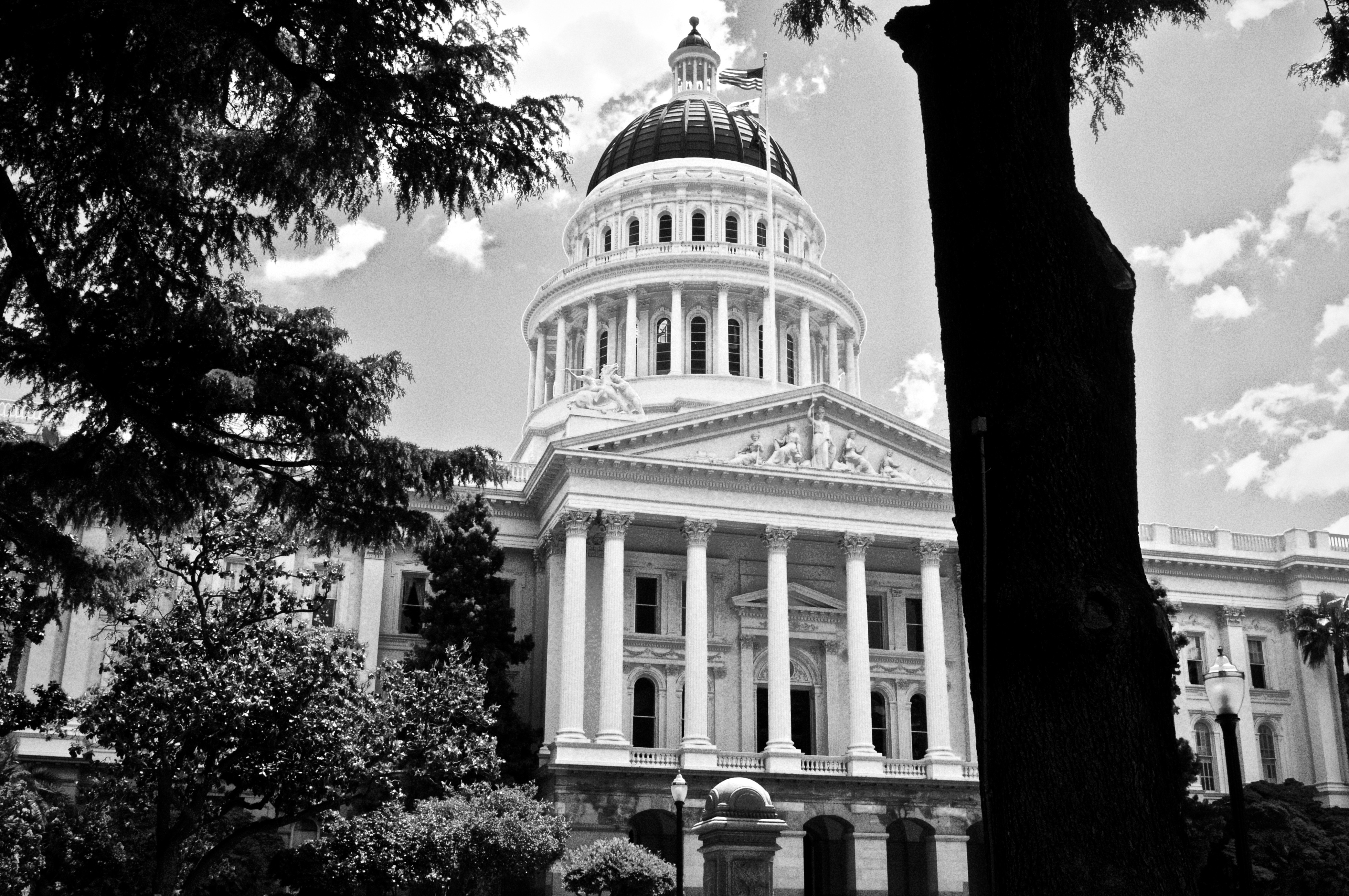
Sen. Ben Allen. (Photo: Kevin Sanders for California Globe)
SB 459 Would Impose New Lobbying Disclosures
These new provisions of law are operative on January 1, 2023
By Chris Micheli, March 13, 2021 8:26 am
On March 10, State Senator Ben Allen (D-Santa Monica) amended his Senate Bill 459 to require additional disclosures by lobbyists. The bill would amend Sections 86114, 86116, 86117, and 86118 and add Section 86119 to, the Government Code.
Section One of the bill would amend Government Code Section 86114 to require that, for each client, the quarterly lobbyist report must indicate the name or number of each bill or administrative action, with regard to which a partner, owner, officer, or employee of the lobbying firm either engaged in direct communication, including through issue lobbying advertisements, or was directed by that client to engage in direct communication, with an elective state official, agency official, or legislative official on behalf of that client for the purpose of influencing legislative or administrative action during the reporting period, either by reference to its legislative or administrative identification number if one exists or by brief description if no such number exists.
In addition, for each bill or issue lobbying advertisement related to a bill, the report shall indicate one of the following that most closely describes the client position directly communicated: “support,” “oppose,” “support if amended,” “oppose unless amended,” “neutral seeking amendment,” “neutral expressing concerns.” The report shall list in chronological order any changes in position during that reporting period but shall not be required to disclose the date of any change in position.
Moreover, the report must not include bills or administrative actions which have failed passage prior to the reporting period, bills or administrative actions which the lobbying firm is only watching or monitoring, or bills or administrative actions which the lobbying firm has not attempted to influence during the reporting period.
Section Two of the bill would amend Government Code Section 86116 to have the Fair Political Practices Commission amend its forms to allow a lobbyist to incorporate by reference the required information above in a report filed by the person’s lobbyist firm.
Section Three of the bill would amend Government Code Section 86117 to require a lobbyist to file a monthly report for any calendar month where the sum of the total amount of all payments subject to reporting pursuant to that section exceeds $15,000. The monthly report required by this subdivision shall be filed during the first 15 days of the month following any qualifying calendar month.
In addition, a lobbyist must, during the period beginning 60 days before the deadline for the passage of bills established by joint resolution of the Legislature, file a report within 24 hours of retaining a lobbying firm to influence legislative or administrative action during those 60 days, including the amount paid to the lobbying firm upon being retained or to be paid to the lobbying firm pursuant to a contract for lobbying. The report must be made public within 24 hours of receipt, either through the internet or distribution or posting of portable document formats (PDFs) of the documents or summaries of the documents online.
A lobbying firm would also be required to file a monthly report for any calendar month where the total amount of payments received for lobbying services exceeds $15,000. The monthly report required would have to be filed during the first 15 days of the month following any qualifying calendar month. Regardless of the total amounts of payments made or received, any person or any lobbying firm may elect to file monthly reports.
Section Four of the bill would amend Government Code Section 86118 to allow original lobbying disclosure documents to be signed and filed with electronic signatures.
Section Five of the bill would add Government Code Section 86119 relating to “issue lobbying advertisements.” The term refers to communications that are authorized and paid for, directly or indirectly, by a person that refers to one or more clearly identified pending legislative or administrative actions and does any of the following:
- Solicits or urges persons to communicate directly with an elective state official, agency official, or legislative official for the primary purpose of attempting to influence state legislative or administrative action.
- Refers to a state legislative or administrative action and urges its defeat, amendment, postponement, enactment, or promulgation.
The types of communications that may qualify as an issue lobbying advertisement include a prerecorded telephone call made to more than 200 persons, a substantially similar email, text message, or other electronic communication that is sent to over 200 recipients, or any other substantially similar communication determined by regulations adopted by the commission.
A pending legislative or administrative action is clearly identified if the communication states a legislative or administrative identification number, official title, or popular name associated with the action. In addition, the action is clearly identified if the communication refers to the subject matter of the action and either states that the measure is before an elective state official, agency official, or legislative official for a vote or decision or, taken as a whole and in context, unambiguously refers to the action.
In addition, an issue lobbying advertisement must clearly and conspicuously indicate in the communication the person that authorized and paid for the communication as the source or payor of the communication. If the person who authorized and paid for the issue lobbying advertisement is a lobbying firm, the lobbyist employer on whose behalf the issue lobbying advertisement was authorized and paid for must be disclosed in place of the lobbying firm.
An issue lobbying advertisement complies with this subdivision if the communication does either of the following:
- Clearly and conspicuously identifies the person as the sender, broadcaster, or creator of the communication.
- Includes the words “Paid for by” or a smaller phrase followed by the name of the person.
Moreover, a copy of any issue lobbying advertisement which clearly identifies an elective state official, agency official, or legislative official must be provided to that elective state official, agency official, or legislative official within 72 hours of being communicated.
A person that incurs cumulative costs equal to or exceeding $5,000 for issue lobbying advertisements in a calendar quarter would be required to file a report with the Secretary of State within 72 hours. The report must be filed with the Secretary of State by online or electronic transmission only using the online filing system for reports. The cost of an issue lobbying advertisement must include actual costs attributable to the communications, but does not include the payment of salary for staff time.
In addition, a report required by this subdivision must include the following information:
- The dates or period of time that each issue lobbying advertisement was communicated.
- The legislative or administrative identification numbers associated with the legislative or administrative action that was the subject of the lobbying issue advertisement. If an action is not associated with an identification number, a short description of the subject matter of the action.
- For each legislative or administrative action for which there were issue lobbying advertisements, the position on the legislative or administrative action urged on the lobbying issue advertisement, which may include “support,” “oppose,” “support if amended,” “oppose unless amended,” “neutral seeking amendment,” or a similar short description.
- For each legislative or administrative action for which there were issue lobbying advertisements, the medium of the issue lobbying advertisements which referenced the action, which may include, for example, direct mail, text messages, television advertisements, radio advertisements, social media advertisements, search engine advertisements, or other online advertisements.
- For each legislative or administrative action for which there were issue lobbying advertisements, the cumulative cost of the issue lobbying advertisements they appear in. If an issue lobbying advertisement referenced more than one legislative or administrative action, then the cost of the advertisement for purposes of this paragraph shall be apportioned between those actions.
- Any other relevant information determined by regulations adopted by the commission.
Issue lobbying advertisement costs would be required to be reported on subsequent periodic lobbying reports without regard to reports filed pursuant to this new law. This new section would become operative on January 1, 2023. The FPPC would be authorized to increase the dollar amounts specified in this section.
Section Seven of the bill provides that these new provisions of law are operative on January 1, 2023. Section Eight of the bill provides a legislative finding and declaration that the bill furthers the purposes of the Political Reform Act of 1974.
- Death Deeds in California - February 27, 2026
- Sources of Law - February 26, 2026
- Commercial Fishing - February 26, 2026





I think that is one of the first common sense bills I have read about in months.
Such a nice change from bills that dictate stores to remove gendered sections on their sales floors.
Thank You Katy for the report.
I wonder how Kamala Harris would define as “direct communication” in Sacramento…
#williebrown